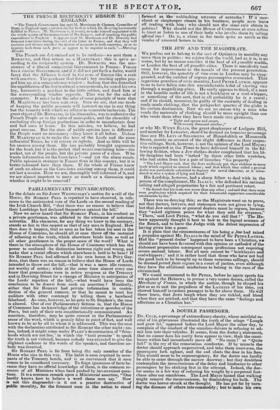THE JEW AND THE MAGISTRATE.
WE profess not to belong to the sect of Optimists in morality any more than in politics : we rejoice that the world, bad as it is, is no worse, but by no means consider it the best of all possible worlds, or London the best of all possible cities. There is manifestly vast room for improvement in the morals of the present generation. Still, however, the quantity of vice even in London may be exag- gerated, and the number of rogues presumptive overstated. That sagacious guardian of civic morality, Lord PETER LAURIE, appears to us to have fallen into this uncomfortable habit of viewing vice through a magnifying-glass. He really appears to think, if a man in the humble ranks of life is not a bricklayer or a coal-whipper, or something of the sort, that in all probability he is a rascal ; and if he should, moreover, be guilty of the enormity of dealing in ready-made clothing, that the pickpocket quarter of the globe is his certain destination. Now we see no reason why a man who vends the materials of clothing should be more upright than one who vends them after they have been made into garments,
" Tight and spruce and smart, With twenty thousand stitches ;"
or why Mr. WYNN E Lid s, the great shopkeeper of Ludgate Hill, and member for Leicester, should be deemed an honester personage than any Mr. LEVI or SOLOMONS of Houndsditch or Monmouth Street, merely on account of the slight difference in their respec- tive callings. Such, however, is not the opinion of the Lord Mayor; who is reported in the Times to have delivered himself in the fol- lowing fashion, when a Jew clothes-dealer complained that his lit- tle daughter had been "larked" by three other little wretches, who had stolen from her a pair of breeches "his property."
"The Lord Mayor said, that the Jews uniformly put their children to some trade which required no manual labour ; and that which they called a general dealer was particularly calculated to deprave the moral character, as it Intro- duced at once a system of lying and fraud."
His Lordship, however, had a sharp fellow to deal with in the person of the complainant, Mr. Isaacs; who defended his national calling and alleged propensities by a fair and pertinent retort.
" He denied that his trade was worse than any other ; and said that there were even professions which acquired for their honourable supporters considerable emoluments by lies."
There was no denying this; so the Magistrate went on to prove, not that doctors, lawyers, and statesmen were not given to lying, but that Jew salesmen or general dealers must be rogues, because they "asked eighteen pence for what they sold for sixpence." " There," said Lord PETER, "what do you call that ? " The He- brew apparently thought it best to bow to the logical acumen of the Bench, and to leave the Judge with the dulcet impression of having given him a poser.
It is plain that the circumstances of his being a Jew had raised a prejudice against Mr. Isaacs in the mind of Sir PETER LAURIE. .
Had the "general dealer" happened to have been a Christian, we should not have been favoured with this opinion ex cathedra of the dishonest propensities consequent upon professions not requiring severe manual labour. But all men cannot be "bricklayers and coalwhippers ;" and it is rather hard that those who have not had the good luck to be brought up to those veracious callings, should be deemedprima facie rogues in a court of justice, even although they have the additional misfortune to belong to the race of the circumcised.
We would recommend to Sir PETER, before he again sports his wit against the Hebrews, to peruse a very scarce drama, called the Merchant of Venice, in which the author, though he shaped his plot so as to suit the prejudices of the LAURIES of his time, yet showed himself in various passages to be far above them. He will there learn, that Jews laugh when they are tickled, and bleed when they are pricked, and that they have the same "feelings and affections as a Christian has."




















 Previous page
Previous page